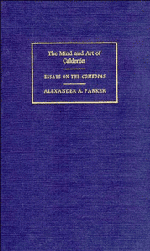Book contents
- Frontmatter
- Contents
- Author's preface
- Editor's preface
- Introduction
- I Stylistic and dramatic craftsmanship
- II From experience to myth
- III The tensions of social life
- IV The tensions of public life
- 18 The king as centre of political life
- 19 Religion and the state: La cisma de Ingalaterra
- 20 The issue of religious freedom
- 21 Religion and war: El príncipe constante
- 22 The drama as commentary on public affairs
- V From symbol to myth
- Epilogue
- Notes
- Index
18 - The king as centre of political life
Published online by Cambridge University Press: 05 February 2012
- Frontmatter
- Contents
- Author's preface
- Editor's preface
- Introduction
- I Stylistic and dramatic craftsmanship
- II From experience to myth
- III The tensions of social life
- IV The tensions of public life
- 18 The king as centre of political life
- 19 Religion and the state: La cisma de Ingalaterra
- 20 The issue of religious freedom
- 21 Religion and war: El príncipe constante
- 22 The drama as commentary on public affairs
- V From symbol to myth
- Epilogue
- Notes
- Index
Summary
It is a special feature of Spanish Golden Age plays from Lope de Vega's time that kings are frequently present, being either referred to or presented on the stage, especially after dramatic writing and performances became centralised in Madrid. The capital city was always referred to as la corte. This usage stemmed from the Middle Ages when the ‘capital’ moved around with the king and his government, being always where his court happened to be at any particular time. The characters in plays are always ‘arriving at the Court’ or ‘leaving the Court’, or discussing the latest customs and fashions of ‘the Court’.
This traditional use of the term represented a reality of which the inhabitants were very conscious, for the life of Madrid revolved round the actual palace in which the king resided. The presence of a king in a play, whether seen or just felt, was a strong sense of authority (of law and order, as we say nowadays) with all the connotations of justice and the moral law. Philip II had prided himself on being accessible to any of his subjects. With the expansion of bureaucratic government this had ceased to be the case in Calderón's time, but in the drama kings are at hand to hear complaints, to pass judgement, and to right wrongs.
This ‘presence’ of the monarch meant that there was always a standard to be appealed to.
- Type
- Chapter
- Information
- The Mind and Art of CalderónEssays on the Comedias, pp. 241 - 249Publisher: Cambridge University PressPrint publication year: 1989

